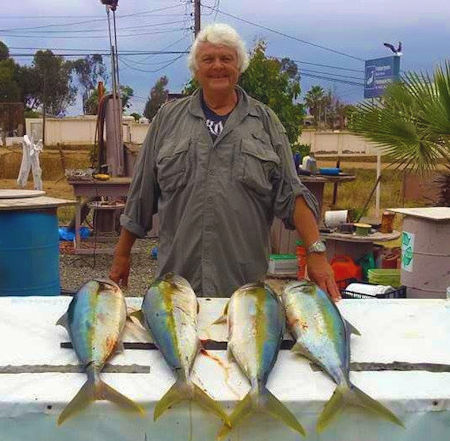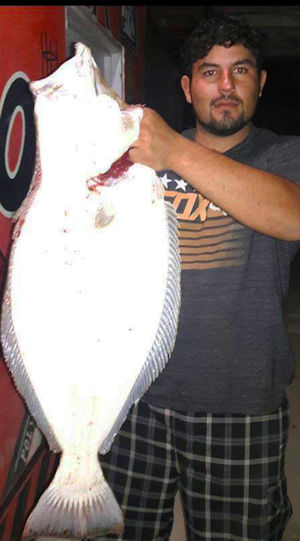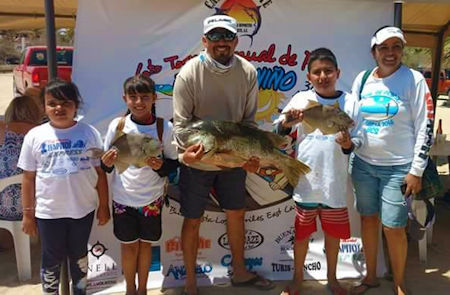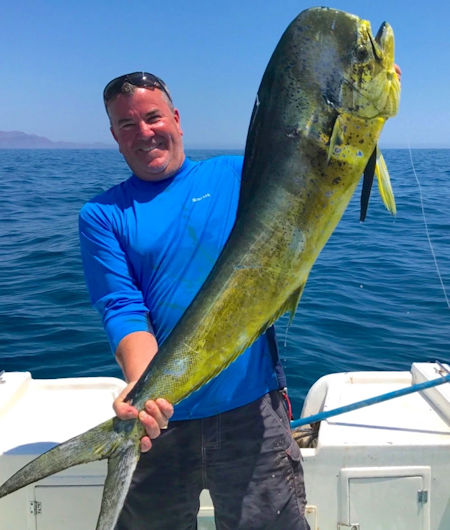 |  |
By Tom Gatch

As we slide into summer, the inland temperatures along the eastern coast of the Baja coast are beginning to soar, which causes the marine layer on the Pacific side of northern and central Baja to thicken and eventually encroach upon its normally sunny weather.
In southern California we call it May gray and June gloom, but judging by recent catch reports, the fish south of the border don’t seem to be bothered too much by it; after all, they still have to eat.
One of the most active species so far this season has been yellowtail, which have been showing up from Islas Coronados all the way down past Guerrero Negro. They also remain one of the most popular pelagic species pursued by Pacific coast anglers because they are such great fighters once they are hooked.
Just below Ensenada, at the southern end of Bahía de Todos Santos, Vonny’s Fleet reports that their pangas have been picking up some big yellowtail on trolled Rapalas, along with respectable catches of bass and rockfish.
A couple of hours drive down the coast, the waters off Bahía San Quintín have been productive for the usual catches of lings, reds and other rockfish. Although, they are beginning to catch a few quality yellowtail in addition to encountering a lot of barracuda schools in the area that seem to attack just about anything shiny that you throw at them.

Capt. Kelly Catian of K&M Sportfishing reports, “We had a fun couple of days with Anton of Pacific Mistress Sportfishing and Quin Salazar. There was a little spotty weather, along with some 15 knot chunk and cold water. We ended up going out to San Martín Island for a crack at some surface action, and found a steady pick on barracuda and one nice yellowtail for Quinn.”
Just off Baja’s central Pacific coast, Jose Angel at Cedros Outdoor Adventures said that the late spring halibut have really been on the chew lately. “It has really been halibut time! We have been taking a lot of good quality flatties near town beaches. The small swell, high tides and clear water have been responsible for part of the success. Our biggest halibut so far weighed about 25 pounds.”
He added “About 8 days ago we fished near to Isla Benitos and took yellowtail in the 40's range using Rapalas and other jigs.”
Further south, the waters off of Bahía Magdalena have been fairly productive for white seabass and yellowtail in the 20 to 30 pound class, although the billfish seem to be on a temporary hiatus. On the bottom, there have also been a few nice grouper that have been landed, which weighed out between 25 and 60 pounds. Inside the estero, the action has been good for halibut, corvina, bass and an occasional grouper, but most of the fish have been of a much smaller size.
Down in Cabo San Lucas, Pieces Sportfishing reports, “The striped marlin are making a return, and have been the main feature of our efforts. However, inshore gamefish have been making up the bulk of catches the past few weeks.
The species have included ladyfish, red snapper, skipjack, roosterfish, jack crevalle, hammerhead shark, grouper, sierra mackerel and sheephead. Our top marlin boat lately, the Pisces Tracy Ann captained by Julio Castro, released 3 striped marlin that were caught by a few of our passengers that were visiting from North Carolina. The fish were landed on caballito live bait and ranged from 120 to 170 pounds.”

They concluded their report by saying, “Tito Olascoaga, the captain of the Pisces Knot Workin, put some lucky anglers from California on one of the few dorado of the week, a nice 35 pounder landed on a blue lure. They also managed to catch and release a 150lbs striped marlin and a 15lbs skipjack.”
Just around the corner on the eastern side of Los Cabos, Eric Bricston at Gordo Banks Pangas offers, “The cooler weather that we’ve been having lately has delayed our seasonal transition and, until we have several weeks of calmer winds and warmer temperatures, we can expect things to remain pretty much the way they are now.
The billfish action has mainly been straight outside of Cabo San Lucas and towards Chileno, and is still a little hit or miss. Dorado are still very scarce, but there have been a few landed. The same goes for wahoo; although in recent days there have been more wahoo strikes reported from areas near Chileno and Santa Maria. This is where the water was a bit warmer and clearer.
Our inshore action consisted of sporadic roosterfish action and decent numbers of sierra being encountered, as well as a few jack crevalle along the surf line. We really need to see more mullet activity to bring in the main run of roosterfish. Supplies of sardinas are now very limited, vanishing, more charters are starting to use chunk baits and strips of squid, particularly for the yellowfin tuna.
The yellowfin tuna action was concentrated from the Iman Banks, San Luis and Vinorama areas, with the majority of the tuna being in the 25 to 35 pound class.”
Bricston added, “The bottom action has been the best option right now, since surface bite has been somewhat limited. Working various rock piles has produced a mix of quality eating species; not many large fish, but all are excellent table fare. Most common were triggerfish, yellow snapper, barred pargo, leopard grouper, island jack, pompano and flag cabrilla. A few amberjack and a couple of grouper, with one weighing at around 80 pounds.”
Up the Cortez coast in Los Barriles on Baja Sur’s famed East Cape, Tu Corazón Sport Fishing’s recent fishing tournament aimed at young, local anglers turned out to be a big success. The Boy’s Tournament produced a lot of smiles, along with one sweet ‘cabrilla grande.’

In the capitol city of La Paz, just a few hours drive north from the East Cape, Jonathan Roldan at Tailhunter International Reports, “What a difference a few weeks make, and what a difference it makes in the fishing when the winds give us a break! For weeks, we’ve been lamenting the winds and how it affected the fishing, but we finally got them to die down.”
This past week, I think we saw over a dozen different species that included wahoo, tuna, marlin, roosterfish, several species of pargo, cabrilla, jack crevalle, pompano, sierra, several species of bonito, triggerfish, snapper and even a few more! You really just never knew what you were going to hook up with!
There’s a reason why we are called the roosterfish capital of the world; we have been catching some huge pez gallo lately. The average rooster ran about 60 pounds this past week, with a number of fish in the 80 pound class. These were beasts and you had to catch the big foot-long ladyfish to use for bait.
We also hooked some striped marlin and rounded things out with bonito, triggerfish and some jack crevalle, reef fish and dorado. One of our guys had on a 50-pound tuna lost at color after about a 30 minute battle as well! This was the best fishing we’ve seen in the area all year.

We have also gotten into some very nice dorado over at Las Arenas; in fact, some of the biggest dorado that I have seen over the past two seasons. There is Sargasso weed building up everywhere, which is a great sign for more dorado. Everything will probably break loose as soon as the water temperature edges up just a degree or two more!”
With hot fishing action like this on tap for the summer season in Baja, it’s obviously time to pack up the car and head south.